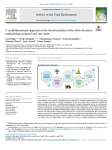Regni L., Sdringola P., Torquati B., Evangelisti N., Chiorri M., Arcioni L., Proietti P. (2025). A multidimensional approach to the decarbonization of the olive oil sector: methodology proposal and case study. Science of the Total Environment, 01/06/2025, vol. 979, p. 179460.
https://doi.org/10.1016/j.scitotenv.2025.179460
https://doi.org/10.1016/j.scitotenv.2025.179460
| Titre : | A multidimensional approach to the decarbonization of the olive oil sector: methodology proposal and case study (2025) |
| Auteurs : | L. Regni ; P. Sdringola ; B. Torquati ; N. Evangelisti ; M. Chiorri ; L. Arcioni ; P. Proietti |
| Type de document : | Article |
| Dans : | Science of the Total Environment (vol. 979, June 2025) |
| Article en page(s) : | p. 179460 |
| Langues : | Anglais |
| Langues du résumé : | Anglais |
| Catégories : |
Catégories principales 06 - AGRICULTURE. FORÊTS. PÊCHES ; 6.4 - Production Agricole. Système de ProductionThésaurus IAMM OLEICULTURE ; HUILE D'OLIVE ; BILAN CARBONE ; CARBONE ; ANALYSE DU CYCLE DE VIE ; ITALIE |
| Résumé : | The productive sectors related to agriculture have the potential to contribute significantly to the energy transition. The paper describes an in-depth investigation on the extra virgin olive oil production towards the decarbonization of the sector. A multidimensional approach is applied, integrating surveys on environmental impacts through Life Cycle Assessment and Carbon Footprint, carbon sequestration, carbon balance associated to emissions and removals, and socio-economic impacts via Life Cycle Costing and consumer surveys. The assessment was performed in the different Mediterranean regions, and the paper includes the results from a representative case study in Italy. Focusing on the production of 1 l of olive oil as functional unit, the most impacting technical processes were identified, and cleaner alternatives proposed and implemented. The amount of CO2 sequestered annually by olive trees was found 1.59 kg/loil, comparable to the CO2eq emitted for oil production ? i.e., 1.58 kg/loil for a 0.75 l glass bottle, and 1.16 kg/loil for a 5 l tin can ? and then resulting in a neutral/negative carbon footprint product in the sustainable management scenario. In economic terms the introduction of the low-impact technical process allows to reduce production costs of 270 euros/ha; while the willingness to pay a premium price for the olive oil with Carbon Footprint certification is estimated around 3 ? for a 0.75 l glass bottle. The proposed methodology could be extended to other agronomic sectors to reduce carbon emissions, enhance traditional techniques and promote sustainable practices, while also seeking to engage the consumer through transparent certification and communication. |
| Cote : | En ligne |
| URL / DOI : | https://doi.org/10.1016/j.scitotenv.2025.179460 |







